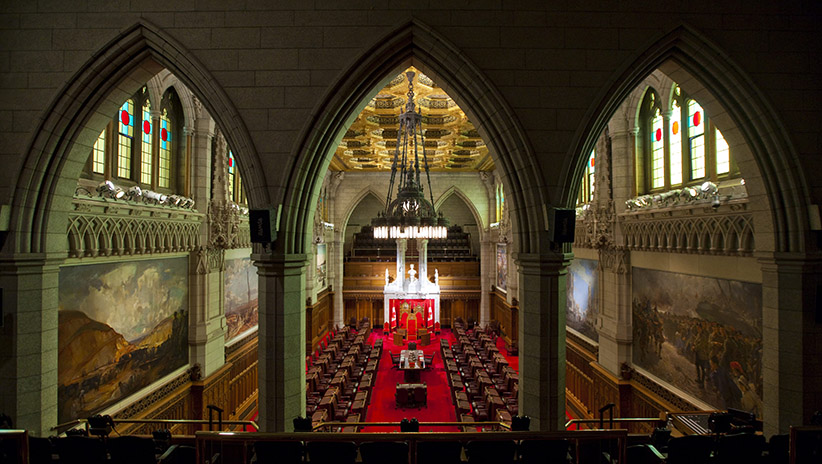Stephen Greene and the case of the strange new Senate
Getting the members of the red chamber to toe the party line is getting increasingly difficult, as the ejection of Senator Greene from the Conservative caucus shows
The Senate chamber on Parliament Hill in Ottawa on Thursday Jan. 13, 2011. (Sean Kilpatrick/CP)
Share

The long process of Stephen Greene’s ejection from the Senate Conservative caucus began last Nov. 15, when he rose in the Red Chamber as sponsor of a government bill.
This was odd. Greene was not affiliated with the government. “I stand before you as a senator who is not part of the government,” he said. “And proudly not part of it.”
Greene, in fact, ran for the Reform Party in the 1993 and 1997 elections, and served as Preston Manning’s Chief of Staff between the two. He was among the 18 senators Stephen Harper named in the chaotic final days of 2008, after Harper nearly lost power to a Liberal-NDP coalition whose putative prime minister, Stéphane Dion, was rumoured to have considered a Senate seat for Elizabeth May. Harper couldn’t have that. He plugged vacancies in the upper chamber with whatever he could find — broadcasters Mike Duffy and Pamela Wallin, party fundraiser Irving Gerstein, and Stephen Greene.
PREVIOUSLY: After appointing 56 senators, Stephen Harper is done
So now, last November, what the heck was Stephen Greene doing?
“I rise today in a modern circumstance,” he said by way of explanation. He was sponsoring Bill S-4, “An Act to implement a Convention and an Arrangement for the avoidance of double taxation and the prevention of fiscal evasion with respect to taxes on income and to amend an Act in respect of a similar Agreement.”
It was a good bill. “Not only a good piece of public policy but also the culmination of work begun during the Conservative government’s tenure,” Greene said.
“In fact, I sponsored three similar bills, virtual copies of this bill, for previous Conservative governments. In other words, I sponsored bills exactly like this when I sat on the other side of the aisle.
“If such bills were good enough for me then, why wouldn’t they be now? For hopefully my brains are not where I sit but where I stand.”
The goal of the bill was to update tax arrangements with Israel, Taiwan and Hong Kong. Well, the first two in particular had no better friend than Stephen Harper, Greene said, and work on these arrangements long predated the 2015 election upset. So he urged everyone to support the bill.
In the gently surreal world of Senate debate, none of Greene’s colleagues replied when he spoke, and nobody mentioned the bill again until nine days later. That’s when Diane Bellemare, another Harper appointee who now sits as an Independent, admitted that she didn’t know much about the bill but she hoped it could be passed quickly. And that was pretty much it for Bill S-4. It passed on a voice vote, which means nobody bothered to demand a count, and received royal assent, three weeks after the events described here.
I indulge this longish biography of the most boring bill in history because I’m starting to educate myself on this strange new Senate, so it’s good practice, and because it’s important to remember that nobody cares about the bill Stephen Greene sponsored. Probably Taiwanese tax lawyers couldn’t even pretend to be into it. Certainly nobody in the Senate cared.
Greene’s offence, in the eyes of his fellow Harper-appointed Senators, was that he did not oppose. The offence was compounded when Greene received, and decided to accept, an invitation to dinner with Justin Trudeau for Senators who have helped pass elements of the Trudeau Liberal government’s agenda.
Punishment was swift: Larry Smith, the former football executive who leads Conservatives in the Senate, told Greene to cancel dinner or leave the Conservative caucus. Greene chose the latter. From now on he’ll be a caucus of one.
But that means he has company. For increasingly, the Senate is composed of free agents who associate in ways that please them, for as long as those arrangements work, and then move on. There are 39 Conservatives — well, 38 now, after Greene — to 35 “non-affiliated” Senators who vote together on rule changes; plus 18 who were appointed as Liberals but who were banished from the party’s caucus by Justin Trudeau in 2014; six who are so thoroughly non-affiliated they don’t sit with the other non-affiliated Senators; and seven empty seats waiting for the next Trudeau appointments.
Most Conservatives believe the non-affiliated grouplets are a hollow sham, that they are all Liberals waiting to be activated. (Sen. Linda Frum’s Twitter feed gives frequent vent to this “Give me a break” sentiment.) And it’s certainly true that those named by Trudeau sound, when you read their bios, pretty Liberal. But they sometimes vote against the government, or complicate its life: in this entertaining interview, Percy Downe, who was Jean Chrétien’s chief of staff and who was sent to the Senate as the Liberalest Liberal who ever Liberaled, contemplates splitting off the Trudeau government’s Infrastructure Bank from the rest of the budget implementation bill. Which is really not what Trudeau wants. He probably doesn’t have a higher economic priority than getting the Infrastructure Bank up and running, and frisky senators don’t help.
So the two leading factions in the House try to sway what happens in the Senate using the best tools available. Trudeau tries charm; the Conservatives, imposed discipline. What each is beginning to realize is that neither method works reliably in this strange new Senate.
MORE ABOUT THE SENATE: